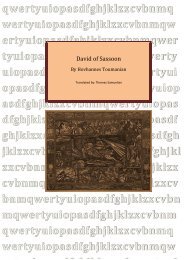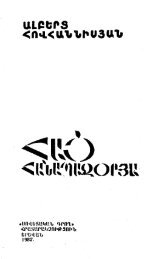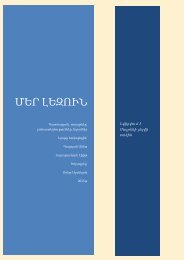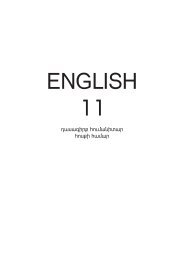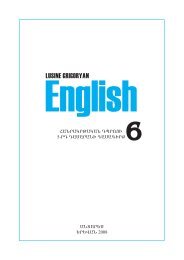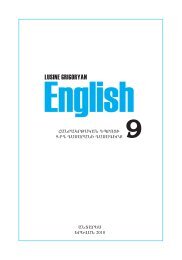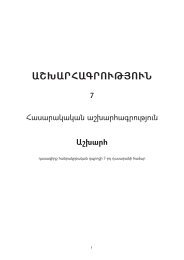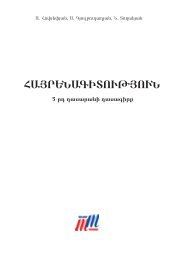Focus on Words
Focus on Words
Focus on Words
Create successful ePaper yourself
Turn your PDF publications into a flip-book with our unique Google optimized e-Paper software.
Past simple was/were + participle II The letter was written.<br />
Past progressive was/were + Ving + participle II The letter was being written.<br />
Past perfect had been + participle II The letter had been written.<br />
Future simple will be + participle II The letter will be written.<br />
Modal modal + be + participle II The letter must be written<br />
Ծանոթություն`<br />
1. Կրավորական սեռը օգտագործվում է այն դեպքում, երբ գործողություն կատարող անձը հայտնի չէ կամ<br />
կարևոր չէ. օրինակ՝ This house was built in the XIV century. Այս տունը կառուցվել է 19-րդ դարում:<br />
2. Կրավորական սեռը անգլերենում ավելի լայն կիրառություն ունի, քան հայերենում: Հայերենում<br />
կրավորական կառույցի ենթակա է լինում համապատասխան ներգործական կառույցի ուղիղ խնդիրը:<br />
Անգլերենում կրավորական կառույցի ենթակա կարող են լինել ներգործական կառույցի ուղիղ, անուղղակի<br />
և նախդրավոր խնդիրները:<br />
Active<br />
Passive<br />
Active<br />
Passive<br />
I gave a book to each of the boys.<br />
A book was given to each of the boys.<br />
Մեկական գիրք տրվեց տղաներից յուրաքանչյուրին:<br />
Each of the boys was given a book.<br />
Տղաներից յուրաքանչյուրին տրվեց մեկական գիրք:<br />
They spoke much of him.<br />
He was much spoken of.<br />
Նրա մասին շատ էին խոսում:<br />
3. Անգլերենի կրավորական սեռի ձևերը թարգմանվում են հայերեն կրավորական սեռի բայերով (կրավորական<br />
կառուցվածքներով) կամ անորոշդիմավոր նախադասության ներգործական սեռի բայով. օրինակ՝<br />
The letter was sent in the morning. Նամակը ուղարկվեց առավոտյան: Նամակն ուղարկեցին առավոտյան:<br />
Table 11: Infinitive or ing<br />
Verbs normally followed by the<br />
infinitive form:<br />
Verbs normally followed by the gerund<br />
form:-<br />
Verbs followed by the gerund or<br />
infinitive form with no change in<br />
meaning<br />
afford, agree, appear, arrange, ask, attempt, care, choose, claim, come,<br />
dare, decide, demand, deserve, determine, elect, expect, fail, get, hate,<br />
help, hesitate, hope, hurry, intend, learn, manage, mean, need, offer, plan,<br />
prepare, pretend, promise, refuse, say, seem, tend, threaten, want, wish<br />
acknowledge, admit, adore, appreciate, avoid, celebrate, c<strong>on</strong>fess, delay,<br />
deny, describe, detest, discuss, dislike, endure, enjoy, fancy, finish,<br />
imagine, involve, keep, justify, menti<strong>on</strong> , mind, miss, omit, postp<strong>on</strong>e,<br />
practice, quit, recommend, regret, report, resume, risk, suggest, tolerate,<br />
understand<br />
begin, c<strong>on</strong>tinue, hate, like, love, neglect, prefer, start, try<br />
Verbs followed by the gerund and<br />
infinitive with a change in meaning<br />
forget to do: I forgot to feed the cat. (The cat is hungry.)<br />
forget doing: I forgot feeding the cat. (I forgot that I had fed the cat.)<br />
regret to do: I regret to tell you that your flight is delayed. (I’m sorry but I<br />
must say that your flight is delayed.)<br />
regret doing: I regret telling him the truth. (I regret that I told him the<br />
truth.)<br />
remember to do: I remember to buy some bread. (I remember that I must<br />
buy some bread.)<br />
remember doing: I remember buying some bread. (I remember that I<br />
bought some bread.)<br />
stop to do: We stopped to drink some water. (We stopped in order to drink<br />
some water.)<br />
stop doing:<br />
try to do: He tried to climb the tree, but he fell down. (He made an effort<br />
to climb the tree, but failed.)<br />
try doing: I can’t find Carol anywhere. – Try ph<strong>on</strong>ing her mother. (Ph<strong>on</strong>e<br />
her mother as an experiment.)<br />
158





